We trace our beginning back to 1937 when J. Lloyd Hunter organized Rural Bible Crusade in Wheaton, IL. But perhaps the true beginning of the ministry was in 1918 in a communistic community in rural Minnesota where Hunter and his wife, Bertha, were inspired with the idea of the Bible Memory Contest. Or perhaps the beginning of the ministry was in 1913 in a mission near Joliet, Illinois, where Hunter was called to minister to children. Or the ministry could be said to have began in 1896 when Hunter, as a small child, accepted Christ as his Savior. Or the ministry may be traced to thousands of years ago when a Man from Galilee told His disciples, “Suffer the little children to come unto Me, and forbid them not, for of such is the kingdom of Heaven.”
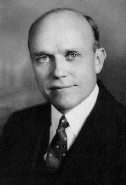 Regardless of the true beginning of the ministry, the history of Bible Impact Ministries is intricately tied to the history of one man – J. Lloyd Hunter. Hunter, a farm boy from Frankfort, Illinois, accepted Christ as his Savior as a child of six years of age and surrendered his life to service for God at the age of 15. Hunter went on to schooling at Shutleff College in Alton, Illinois, and Moody Bible Institute in Chicago, Illinois. During his last year at Moody, Hunter served as minister at the Ridgewood Baptist Church in Joliet, Illinois, and would also preach at pacific Garden Mission. It was at this Mission that hunter knelt with a ragged drunkard and led him into the family of God. This grown man, this drunkard saved by grace, was a picture of years of waste and futility Hunter would not forget. As Hunter knelt with this man, saw the filth, smelled the alcohol, and witnessed the changing power of God’s grace and mercy, he thought to himself, “If only this man had been won to Christ as a boy, his whole life would have been saved.” There in that mission, with that drunkard, Hunter felt the call of God to give his life to teaching children about Christ.
Regardless of the true beginning of the ministry, the history of Bible Impact Ministries is intricately tied to the history of one man – J. Lloyd Hunter. Hunter, a farm boy from Frankfort, Illinois, accepted Christ as his Savior as a child of six years of age and surrendered his life to service for God at the age of 15. Hunter went on to schooling at Shutleff College in Alton, Illinois, and Moody Bible Institute in Chicago, Illinois. During his last year at Moody, Hunter served as minister at the Ridgewood Baptist Church in Joliet, Illinois, and would also preach at pacific Garden Mission. It was at this Mission that hunter knelt with a ragged drunkard and led him into the family of God. This grown man, this drunkard saved by grace, was a picture of years of waste and futility Hunter would not forget. As Hunter knelt with this man, saw the filth, smelled the alcohol, and witnessed the changing power of God’s grace and mercy, he thought to himself, “If only this man had been won to Christ as a boy, his whole life would have been saved.” There in that mission, with that drunkard, Hunter felt the call of God to give his life to teaching children about Christ.
From here Hunter went on to work with the American Sunday School Union in Montana, North Dakota, and Minnesota. While in Minnesota, Hunter and his wife found themselves working among a group of communist sympathizers. Hunter wrote of them in a later R.B.C. newsletter, “They were holding weekly meetings, plotting the overthrow of the government, fostering hatred, violence, rebellion.”
In 1937 while living in Wheaton, Illinois, Hunter, who was then in ill health, officially organized Rural Bible Crusade, a ministry using the Bible Memory program to reach children throughout the states. The first Advisory Council of R.B.C. consisted of great men of the faith, such as J. Oliver Buswell Jr., V. Raymond Edman, J.D. Hall, John R. Rice, Bob Jones Sr., Wendell Loveless, Oscar Lowry, William McCarrell, Harry Rimmer, Paul Rood, George Strohm, Walter Wilson, and Louis T. Talbot.
Under the leadership of Hunter and this council, about ten or twelve full-time workers organized Scripture memory programs in rural schools in Iowa, Wisconsin, Minnesota, New York, and New England. When starting a new work, Hunter would visit a state and help local Christians organize the Bible Memory contest; a chairman would be chosen and missionaries would begin to work in that state. In the March 6, 1943 issue of the Sunday School Times, Hunter reported, “We have never seen rural children so eager for the Gospel. . . By November 15, in Iowa and Wisconsin alone we had nearly ten thousand children, besides hundreds of school teachers, memorizing Bible verses.” Hunter went on to tell how the work of the Word of God in these children’s lives was leading them to share this Word with others. He wrote, “We have never had so many reports of souls won by our children as we are getting this year.” Hunter tells the story of a child who, within a week of her conversion, won five others to Christ in a single day.
In the spring of 1943, Hunter entered the hospital where he would do his last work for his Savior before meeting Him face to face. Even while deathly ill, Hunter led three nurses in a hospital in Rochester to Christ and also a patient who was his roommate at Elmhurst Hospital. On June 17, 1943, at 2:10 p.m., Mr. Hunter, at the age of 55, went home to be with the Lord he had served so faithfully. Hunter’s obituary in the Wheaton newspaper stated, “His fervor for souls and great love for his Savior inspired many to give their whole life to Christian service. He was a staunch believer in child conversion and had great faith that they in turn could win others.”
The work of R.B.C. among children did not die with Mr. Hunter. Businessman C.H. Benware wrote of the ministry after Hunter’s death, “Rural Bible Crusade was born because God laid on the heart of one man a passion for rural children lost without Christ. While yet in its infancy, God took Mr. Hunter to be with Himself. The infant survived because Mrs. Hunter refused to let it die.” Bertha Hunter assumed the duties of secretary, and Mr. David Forsythe became acting superintendent upon Hunter’s death. In the annual bulletin sent out in December of 1943, six months after Hunter’s death, it was reported that 404 children in the states of Illinois, Iowa, Wisconsin, Minnesota, Indiana, and Missouri had completed the 500 Bible Memory verses during the year between September of 1942 and August of 1943.
A reported 669 souls had come to know Christ as their Savior during this year. At this time, R.B.C. had nine full-time workers on the field. The bulletin also reports that R.B.C. programs had been launched in the states of Kansas and Wyoming.
Bertha Hunter knew that her husband’s goal had been to win souls, which he did daily, and not to organize. Mrs. Hunter realized that now the future course of action for R.B.C. must be more plainly defined. “At his home going my burdened heart cried to God day and night that the work would not die but continue to be used of God to reach rural youth,” Mrs. Hunter said. She asked the members of the R.B.C. Advisory Council to meet on November 18, 1943, at Moody Bible Institute to discuss the future of the ministry. Only Rev. Wendell Loveless, J.D. Hall, and William McCarrell were able to attend this meeting, with all other members of the council, with the exception of one, sending their regrets on not being able to attend. The present members decided to dissolve the Advisory Council, which consisted of 15 men from all parts of the country. The council had held no executive powers and had experienced difficulty in gathering together so many men from various parts of the country. It was also decided at the meeting that a committee be formed to draft a constitution for Rural Bible Crusade.
On December 20, 1943, this committee, made up of Elliot F. Gibbs, W.L. Graham, D.L. Forsythe, and C.H. Benware, met at Wheaton College. During this meeting the committee wrote the first five articles of a tentative constitution. This constitution defined the purpose of R.B.C. as “to proclaim the Gospel primarily to spiritually neglected children.” Work on the constitution continued for three months, and upon completion, copies were submitted to all state organizations for consideration.
A four-day conference was held August 3-6, 1944, with representatives from states interested in organizing into a national organization meeting for the following purposes:
- For the perfecting and adopting of a permanent constitution,
- For the selecting of a permanent national committee,
- For the selection of a national director,
- For the purpose of getting acquainted and making the work known as far as possible.
From this convention, the Rev. J.H. Kornelson of rural Kansas was called to serve as Executive Secretary and Rural Bible Crusade National was formed. This convention united the work of Rural Bible Crusade across the nation under one national office. However, some states, such as Missouri, Wisconsin, Oklahoma, and Iowa, continued to work independently, choosing not to merge with R.B.C. National.
During the first year of Rural Bible Crusade National, more than 60,000 students in rural public schools were enrolled in the Bible Memory Program. The following year enrollment stood at 80,000, then 90,000 and continued at over 100,000 for the next three years. Missionaries were putting the Gospel of Christ into the hands of 100,000 children, and thus 100,000 households, that previously may have had no knowledge of Christ. One teacher wrote to the R.B.C. office in 1949 saying, “when I came to this school there was only one home in the community that had a Bible besides mine. Now through the Crusade every home with children in school has a Bible that was earned by memorizing Bible verses.
It was during these years that God called another man to a long-time ministry to America’s children. Bob J. Clark was a freshman at Kansas City Bible College when two men from Rural Bible Crusade came to the college to present their work. Sitting in a dark room, watching a slide presentation, Bob Clark felt the call of God. A slide was shown of a small boy feeding a pen of pigs while the sun was setting. Clark, who had grown up feeding the livestock on his grandparents farm in rural Kansas, felt the call to minister to children such as this young boy.
 “It was just such a miraculous thing,” Clark said. “The Lord just spoke to my heart, and I had perfect release. I said, ‘Well, that’s just the work for me’.” After graduating from Kansas City Bible College in 1949 and serving as chaplain of a Tuberculosis Sanitarium in Mount Vernon, Missouri for a summer, Clark joined the work in the fall of 1949. He spent his first year with R.B.C. visiting schools in Wichita, Kansas and in 15 counties in south central Kansas. As many other missionaries in many other states were doing, Clark would obtain a county map, mark out all the rural elementary schools, then visit the county school superintendent and inform him of the work. “I would walk in the door and say, ‘I’m Bob Clark from Rural Bible Crusade, and I’m here to talk to your young people about memorizing scripture and give them an opportunity to attend camp.’ Out of 105 counties in Kansas we could probably get in 95 of them,” Clark said.
“It was just such a miraculous thing,” Clark said. “The Lord just spoke to my heart, and I had perfect release. I said, ‘Well, that’s just the work for me’.” After graduating from Kansas City Bible College in 1949 and serving as chaplain of a Tuberculosis Sanitarium in Mount Vernon, Missouri for a summer, Clark joined the work in the fall of 1949. He spent his first year with R.B.C. visiting schools in Wichita, Kansas and in 15 counties in south central Kansas. As many other missionaries in many other states were doing, Clark would obtain a county map, mark out all the rural elementary schools, then visit the county school superintendent and inform him of the work. “I would walk in the door and say, ‘I’m Bob Clark from Rural Bible Crusade, and I’m here to talk to your young people about memorizing scripture and give them an opportunity to attend camp.’ Out of 105 counties in Kansas we could probably get in 95 of them,” Clark said.
Clark would go to these schools, which were mostly one-room school houses, sing a chorus with the children, quote John 3:16 with them, show them the prizes they could win and distribute leaflets of 500 verses. The very first verse in these leaflets was what Hunter called the “Golden Text of the Bible,” “For God so loved the world that He gave His only begotten son . . .” John 3:16 – the first verse children involved in Bible Impact Ministries today learn.
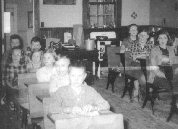 Children who learned this verse were given a copy of the Gospel of John. The teachers would then help the students learn the leaflets of verses, and sometimes the teachers themselves would memorize the scriptures. “Very few teachers would say, ‘No, we’re not interested’.” Clark said. One Kansas teacher, Wanda Schmidt, after learning of the R.B.C. program, would change schools every four or five years in order to evangelize another school.
Children who learned this verse were given a copy of the Gospel of John. The teachers would then help the students learn the leaflets of verses, and sometimes the teachers themselves would memorize the scriptures. “Very few teachers would say, ‘No, we’re not interested’.” Clark said. One Kansas teacher, Wanda Schmidt, after learning of the R.B.C. program, would change schools every four or five years in order to evangelize another school.
Upon memorizing all 500 verses, the children were sent a Bible and were qualified for a free week of summer camp. Individual camps were held across the active states. Clark recalls one eight-year old girl who learned the 500 verses in Iowa in 1950, then faithfully completed R.B.C. correspondence courses for many years.
Eventually this young girl joined the staff of R.B.C., then went on to become a missionary to Iran. “She told me her missionary work began when she began memorizing those first 500 verses,” Clark said. And she is one of many children whose lifetime of service began with a leaflet of memory verses.
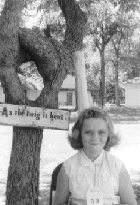 During the summers when school was out of session, R.B.C. missionaries would work at R.B.C. camps and organize summer Bible School programs. While traveling during the school year, the missionaries would note communities where summer Bible School programs could be held. “I would take my county map and circle the places that I thought would be good locations for Bible Schools,” Clark said. The missionaries would then gain permission from the local school board to conduct Bible School in the public schoolhouse, and would make arrangements for living quarters with a local family for the week.
During the summers when school was out of session, R.B.C. missionaries would work at R.B.C. camps and organize summer Bible School programs. While traveling during the school year, the missionaries would note communities where summer Bible School programs could be held. “I would take my county map and circle the places that I thought would be good locations for Bible Schools,” Clark said. The missionaries would then gain permission from the local school board to conduct Bible School in the public schoolhouse, and would make arrangements for living quarters with a local family for the week.
Clark can even recall spending one week sleeping in the schoolhouse. Many rural young people came to know Jesus Christ during these weeks. “We pioneered the Vacation Bible Schools,” Clark said. “Many areas had never heard of a Bible School.” In areas where no schoolhouse was available, Bible schools were held in such places as rest homes and firehouses, anywhere where the Gospel of Christ could be shared with children.
J.H. Kornelsen resigned as Executive Secretary in 1957. J. Kenneth Nielson succeeded Kornelsen and served as director for three years from 1958-1962. He was followed by Gordon Kemble Jr. who was director from 1963-1966. Bob Clark moved to Salina, Kansas in 1952 to serve as the director for the state of Kansas, then became director of the western district.
In the early 1960’s, R.B.C. National was forced to redesign their program. The consolidation and unification of school systems closed many rural one-room schoolhouses as larger school districts were formed and busing began.
A Supreme Court ruling excluding Bible reading and prayer in the schools soon followed the consolidation. Missionaries, who were used to being welcomed into the rural schools, were being turned away from school after school. Two young lady missionaries came back to Kansas headquarters after 30 days of canvassing without being allowed to present the ministry in a single school.
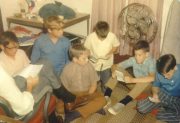 “They said, ‘We might as well quit’,” Clark said. They were sent back onto the field and contacted another 25 counties that turned them away. “I knew after 25 years, God wasn’t through with the ministry. We just had to switch our means of reaching kids,” Clark said. Missionaries were sent into areas where camps or Bible School programs had been held in previous summers, and groups began to meet to memorize scripture outside of the school system, and the first Bible Memory Clubs were formed.
“They said, ‘We might as well quit’,” Clark said. They were sent back onto the field and contacted another 25 counties that turned them away. “I knew after 25 years, God wasn’t through with the ministry. We just had to switch our means of reaching kids,” Clark said. Missionaries were sent into areas where camps or Bible School programs had been held in previous summers, and groups began to meet to memorize scripture outside of the school system, and the first Bible Memory Clubs were formed.
Mailing lists from former memorizers and Bible School students were used to locate children to form clubs which met each week. “It was really hard at first,” Clark said. “We had to work on kids who already had been to camp to return to maintain our camp numbers. It was really a soul-searching time.” But soon the fruits of the club ministry began to show. Children, who were meeting with missionaries or club leaders each week, were beginning to accept Christ at club meetings. Where before students had been presented with the program then left to memorize on their own, they were now receiving weekly spiritual guidance at club meetings. “We began to see children get saved and begin to grow in grace, and what better way to grow in grace than through Scripture memorization?” Clark said. Soon after the formation of the clubs, R.B.C. leaders realized that many children were memorizing 250-300 verses but were unable to complete the 500 verses required for camp. At a convention in Wheaton, Illinois, it was voted to reduce the required number of verses to 300, and eventually it was lowered to 200, to give more children an opportunity to attend summer camp free of charge.
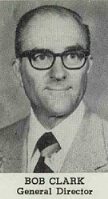 R.B.C. underwent a second change in 1966 when the ministry’s headquarters was moved from Wheaton, Illinois to Salina, Kansas, and Bob Clark was named as Director, a position he would fill for 24 years. Clark began to work on expanding the correspondence courses available to children who had completed memorizing the first set of verses. At that time, only 4-5 years of correspondence work was available to students who wished to continue in the R.B.C. program. Soon the program expanded to 15 correspondence courses children could work on and continue to come to summer camp.
R.B.C. underwent a second change in 1966 when the ministry’s headquarters was moved from Wheaton, Illinois to Salina, Kansas, and Bob Clark was named as Director, a position he would fill for 24 years. Clark began to work on expanding the correspondence courses available to children who had completed memorizing the first set of verses. At that time, only 4-5 years of correspondence work was available to students who wished to continue in the R.B.C. program. Soon the program expanded to 15 correspondence courses children could work on and continue to come to summer camp.
As the number of campers increased, the number of teenagers increased in direct proportion. They began to request their own events, rather than only having programs with the juniors. A group of teens called Doug Clark and asked if they could hold a Teen Retreat between Christmas and New Years’ 1989. Doug said, “Here’s a phone, here’s a list of names, you can start calling.” With little effort, there were 25 teens. Teen Camps were also added in Illinois and Kansas in the early 90’s.
The location of that first Teen Retreat was another answer to prayer. The staff had been led to pray for a permanent headquarters’ facility for several years. The board had authorized the staff to begin to look for property and develop plans for construction. On a trip around Salina, KS looking for property, a vacant five year old building attracted attention. Upon inquiry, the facility that God had for RBC was found. With the addition of a doorway, removal of a wall, and other minor renovation, the exact floor plan that had been planned for was available. God had led!
The board met to discuss the property, an offer was made with the contingency that one half of the funds had to be raised in 3 months, and the building had to be paid for in one year. In three months, $10,000 more than half had been provided and God provided the entire amount, plus the amount for renovation and furniture in two days more than the year!
Since our desire was to expand the ministry and not be limited to “rural” areas, the initials “RBC” had been used for the name rather than “Rural Bible Crusade” during the last half of the 1980’s. This change was clearly understood by those who knew the ministry, but it created questions for those who did not. On September 1, 1990, the organization officially became known as “Bible Impact Ministries”. Our name accurately represents what we seek to do – IMPACT lives through the BIBLE – the Word of God.
The church that Bible Impact Ministries has set as it’s target is the small to mid-size church. As we listened to these pastors and youth leaders, they were increasingly interested in “more” for their youth that just scripture memory. Since these churches don’t have a full-time youth staff and rely on those already busy, they needed assistance for the entire program – the opening, the lessons, the outreach, and the games. School year 1991 – 1992 was the first year for the “Bible In Me!” Youth Clubs program, a program that is still actively producing “Tomorrow’s Leaders”.
Also, in the early 1990’s, times of discussion and prayer were held to answer the question, “What if Bible Impact Ministries had their own camp facility?” At the end of 1992, the board adopted a long range plan that included three primary ingredients: 1. The addition of a camp facility to the ministry. 2. The increase of our Summer Ministries Program. 3. The addition of a Teen Club program to the existing “Bible In Me!” Youth Clubs program. As 1993 began, only God knew how these steps of faith would be answered!
Before the story of our history can continue past 1992, we must travel back to an earlier time. God’s promise to “bring it (our way) to pass” was providentially intertwined in the beginning and operation of two other organizations.
In 1934, Mr. William H. Morrison completed the acquisition of farm property located in Crawford County, Missouri. He purchased the land from family members, possibly joint heirs from previous generations. This land was then sold in it’s entirety to a group from Hope Congregational Church in St. Louis, representing the Ozark Self Help Bible School. The funds were provided by Hugo Wurdack, a wealthy benefactor, whose generosity has made possible other ongoing charitable ventures in the area.
The Ozark Self Help Bible School was a vocational bible institute, and through the operation of the farm, students were helping provide the resources needed to conduct such a ministry. In 1951, the land began to be used as a camp and was given the name TADMOR – which is a city from 2 Kings 9:18 and means “beautiful palms”.
Meanwhile, in the fall of 1941, Mr. Hunter, the founder of Rural Bible Crusade (now Bible Impact Ministries) addressed the Men’s Bible Class at the Memorial Presbyterian Church in St. Louis. He shared the activities of RBC in various states and the men were inspired by his enthusiasm and interest in the work.
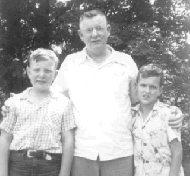 On August 17th, the men decided that this was a work worthy of their support and the decision to begin the work of RBC of Missouri was made. The outreach in the schools began as teachers could be contacted, and by the end of the 1953 – 54 school year, nearly 50,000 young people had been contacted with the opportunity to memorize the Word of God, and nearly 2,000,000 verses had been memorized by young people from the state of Missouri alone!
On August 17th, the men decided that this was a work worthy of their support and the decision to begin the work of RBC of Missouri was made. The outreach in the schools began as teachers could be contacted, and by the end of the 1953 – 54 school year, nearly 50,000 young people had been contacted with the opportunity to memorize the Word of God, and nearly 2,000,000 verses had been memorized by young people from the state of Missouri alone!
In 1950 Mr. Vallie Douglas, a tool maker from St. Louis, joined the RBC board as treasurer. Soon after, he was appointed as the director of the young outreach to the youth of Missouri, serving part-time. On November 29, 1953, he was installed as full-time Director.
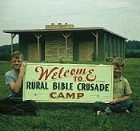 In 1961, the link between Bible Impact Ministries (Rural Bible Crusade at that time) and the property then known as Tadmor was begun as Mr. Douglas and a group of individuals formed another non-profit organization known as Whispering Winds Bible Camp, Inc. The Tadmor property was purchased as the location for the Rural Bible Crusade of Missouri camps and was also used by churches as the location for retreats, camps and conferences. This ministry continued for many years. In 1993, the Whispering Winds board made the decision to seek a new owner for the property, to carry out the goals of the founders.
In 1961, the link between Bible Impact Ministries (Rural Bible Crusade at that time) and the property then known as Tadmor was begun as Mr. Douglas and a group of individuals formed another non-profit organization known as Whispering Winds Bible Camp, Inc. The Tadmor property was purchased as the location for the Rural Bible Crusade of Missouri camps and was also used by churches as the location for retreats, camps and conferences. This ministry continued for many years. In 1993, the Whispering Winds board made the decision to seek a new owner for the property, to carry out the goals of the founders.
Remember the decision of the Bible Impact board in 1992 to develop a permanent camp facility as part of the long range plans? By the fall of 1993, the first team of staff and interested volunteers had made the first trip to St. James, MO and the prayer that God would make His will clear had been offered many times.
The rest is current history. The BIM Board made the decision to acquire the camp property, the Salina office was put up for sale, and plans to move the ministry headquarters to MO were made. Realtors predicted that the sale of the office would take from six months to one year. In thirty days, we had a signed contract. The office, purchased in 1989 and paid for in 1990, was the beginning of God’s savings plan to allow us to begin the development of Whispering Winds.
 The move to Missouri took place in July of 1994 and camp was first held here in 1995. Hundreds of individuals volunteered their time in the early years, and construction began. Camp attendance increased 72% in the first 6 years that BIM has operated from WWBC. From one outdoor program in 1997 to 6 in 2002, God has allowed us to use the facilities He provided in a great way, as well as the natural resources of the Ozark region.
The move to Missouri took place in July of 1994 and camp was first held here in 1995. Hundreds of individuals volunteered their time in the early years, and construction began. Camp attendance increased 72% in the first 6 years that BIM has operated from WWBC. From one outdoor program in 1997 to 6 in 2002, God has allowed us to use the facilities He provided in a great way, as well as the natural resources of the Ozark region.
While stopping to look back, the staff and board of Bible Impact Ministries are also looking to the future years. They hope to see more clubs formed, more campers attending the summer camps, and more teens being trained for service.
“Everything we’re doing now, we’d like to see expand,” Bob Clark said. “Not to count numbers, but to make numbers count. The more kids you have, the more souls you’ll reach.”